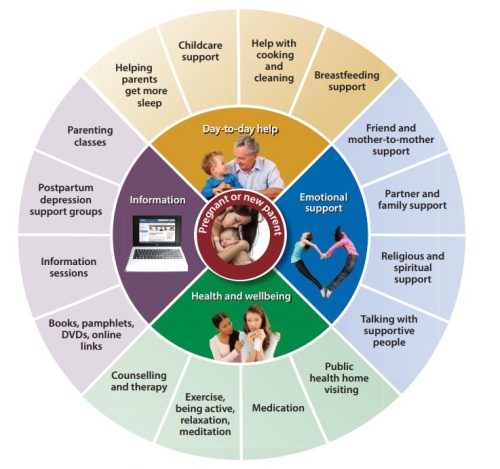
When you experience depression and anxiety, it affects how you feel, your thoughts, what you say and what you do. It may also affect your relationship with your partner and others. Taking care of yourself and your baby can be difficult.
Postpartum Depression is the most common medical problem after having a baby. You can increase your ability to care for yourself and your baby by having a better understanding about:
There are different ways to treat depression. When depression is left untreated, it can have serious effects on you and your baby. You may need counselling and/or medication to get better.
There are a number of things you can do to help yourself feel better faster.
Eating well is important during pregnancy, after birth and while breastfeeding. For some individuals eating well can be difficult, as during these times your body goes through many physical and hormonal changes. These changes can impact your appetite, your mood and how you cope with daily stress.
If you are not eating regularly or not eating enough nutrient-rich foods, it could be affecting your energy and mood. If eating well feels like a big challenge, focus on small changes:
Paying attention to where, when, why and how you eat can make a difference:
Sleep can affect your mood, short term memory, and your ability to manage stress. It is important to make time to sleep and get rest after your baby is born. You may have difficulty falling asleep or you may wake up after a short while and not be able to get back to sleep.
If none of these tips help you sleep, please see your doctor or a nurse.
Getting support from others can help you cope when you feel stressed. Support can come from your family, friends, community members and organizations. It is helpful to understand who you have in your life that can provide support after you have your baby. Don’t be afraid to ask for help.

This circle can help you identify who provides support in your life. It shows the four areas of support with examples for each area to help you build the supports that can help you.
Helping hand from others to allow you to focus on rest and feeding your baby.
Include the support you receive from others when sharing your feelings and emotions.
Support from a doctor or nurse when treatment is needed.
Learn more about postpartum depression and anxiety.
Tell your partner or caregiver how you are feeling and what you need from them. They can play an important role in how you may be feeling and the amount of anxiety you may have. Attend doctor and therapy sessions together.
Remember: You are not alone, there is help.
Printable Versions:
简体中文
Chinese
English
English
Español
Spanish
Physical activity can help with depression and make you feel better both physically and emotionally. It may feel like you have no time or energy to be physically active but regular activity can help you feel better faster.
You can build physical activity into your everyday routines. Every little bit counts. Take the stairs instead of the elevator, stretch a few minutes every hour, play with your children, walk instead of driving for short trips, work in the garden or shovel the snow.
Physical activity is cheap, easily available, fun and a good way you can spend time with your baby.
The Toronto FUN Guide has many programs and activities that may interest you.
Consult with your doctor or nurse before you exercise to make sure there are no medical reasons keeping you from being active.
Video: Road to Recovery.Couples discuss the support they received from the health care team in their road to recovery.